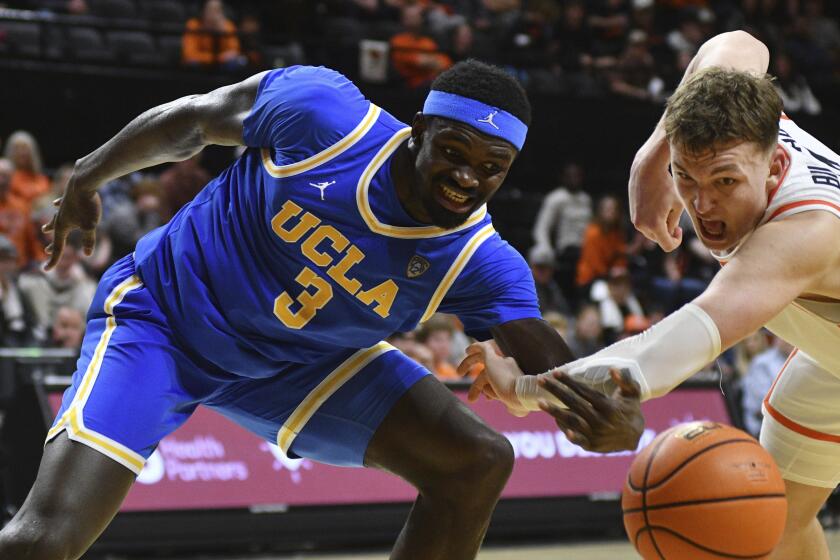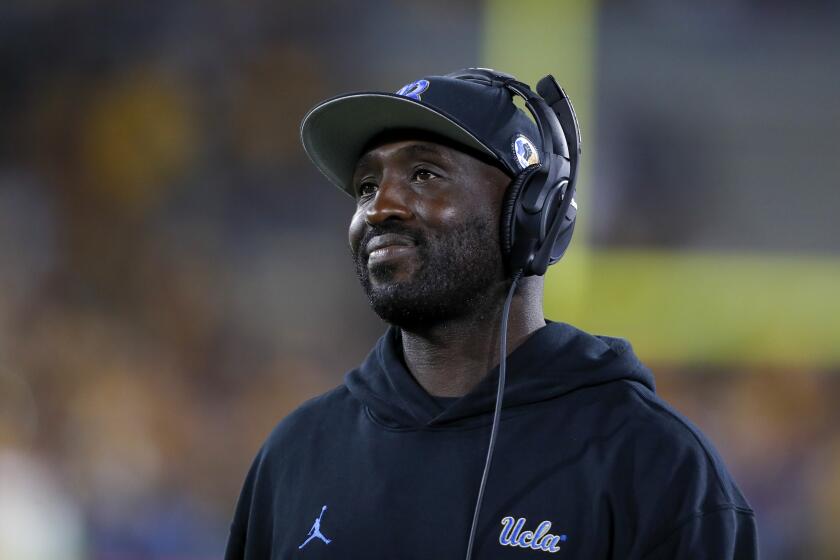One Step and the World Changed for Ferguson
The scream was so loud and terrifying that it produced an eerie silence among those who heard it.
Jason Ferguson was running a post-corner pattern during a football camp for top high school prospects last June at UCLA. Just as he planted his right foot to make a cut and fake out his defender, Ferguson collapsed to the ground and grabbed his knee.
“It felt like something came apart, something snapped,” he said. “It was a sick feeling. I remember hearing it, and that’s what freaked me out. It was like a burning sensation.”
Ferguson had come to the camp hoping to convince coaches and players that his 5-foot-6 size wouldn’t prevent him from becoming an NCAA Division I receiver.
In his junior year at Los Angeles Fairfax High, he scored 34 touchdowns as a running back, receiver and return specialist. He was expected to rank among the top players in the City Section for his senior year.
Initially, he thought his knee injury wasn’t serious despite his piercing scream. He was helped off the field and a trainer applied ice. Ten minutes later, the pain had diminished.
He went to his family doctor the next day, then was given an MRI. The technician told him the results in blunt terms: “You tore your ACL.”
Ferguson started to cry.
“I thought that was the end of everything,” he said. “The first thing that came to mind was college, then I’m not going to be able to play my senior season with my friends.”
On June 26, almost three weeks after tearing his anterior cruciate ligament, he underwent reconstructive knee surgery. Schools that had been sending him recruiting letters mostly stopped, as did their phone calls.
He missed his senior season. He has a visit set up to Portland State next week, but no school has made an official scholarship offer going into letter of intent day on Feb. 5. Most schools want to see how he responds to rehabilitation, even though in a matter of months he expects to be running 4.5-second 40-yard dashes again.
If he could go back in time, back to the moment he planted his foot on that warm summer day, he’d gladly reverse course to avoid the emotional and physical turmoil he has endured.
“If this kid had played his senior year, he would have been the most exciting player in the City,” Fairfax Coach Shane Cox said.
The negative aspects of the injury were difficult for Ferguson, but he also discovered some redeeming qualities.
The absence of football forced him to redirect his focus to academics. His SAT score climbed from 830 to 1,010.
“I flipped totally,” he said. “Instead of crying and not doing my work, I hopped straight on the bus to studying.”
He went behind the scenes of the Fairfax football program to gain insights he never would have observed if he were playing. He helped coach the team’s running backs and got a feel for the responsibilities that coaching entails.
He began to understand more clearly the world of college recruiting.
“It’s a business,” he said. “You’re only as good as your last performance.”
Most of all, he learned how quickly priorities can change.
“Whatever you have, it can be taken away from you,” he said. “You have to take it one day at a time.”
Ferguson was one of a growing number of players participating in summer camps sponsored by college programs in an effort to get a closer look at potential prospects. He suffered the worst-case scenario -- a serious injury. He said he regrets going to the camps and believes performances during the high school season should be enough to convince recruiters of a player’s ability.
But schools will continue to hold camps and recruiting services will continue to hold combines because they want to know the real 40-yard times, the real heights and weights, the real personalities of the players. It’s not necessarily a bad idea, but players should be aware of the dangers involved.
These days, Ferguson is running on a treadmill, strengthening his right knee.
“I was running the mile and my leg was burning,” he said. “I couldn’t stop. Quitting is too easy.”
He remains optimistic and resilient even though there is uncertainty about his football future.
“I like it,” he said. “People are going to remember my name when I make it.”
Now it’s up to some college coach to place a bet on Ferguson, who promises to reward the school that demonstrates such loyalty.
“There’s so many schools in this country,” he said. “Somebody will take a chance on me. I’m 6 1/2 months off surgery, and [my knee] already feels good.”
Eric Sondheimer can be reached at eric.sondheimer@latimes.com
Go beyond the scoreboard
Get the latest on L.A.'s teams in the daily Sports Report newsletter.
You may occasionally receive promotional content from the Los Angeles Times.




